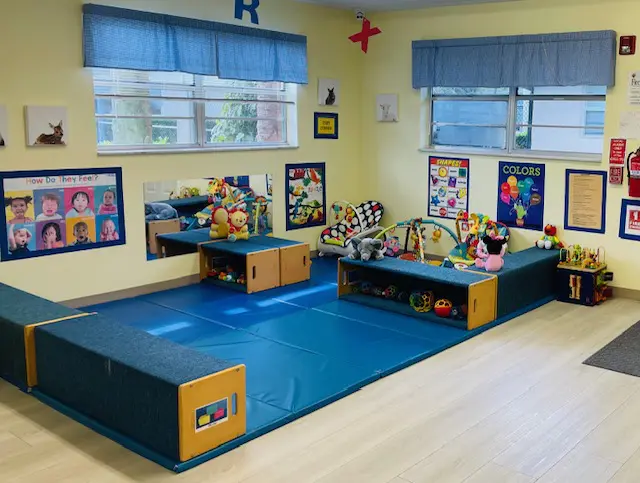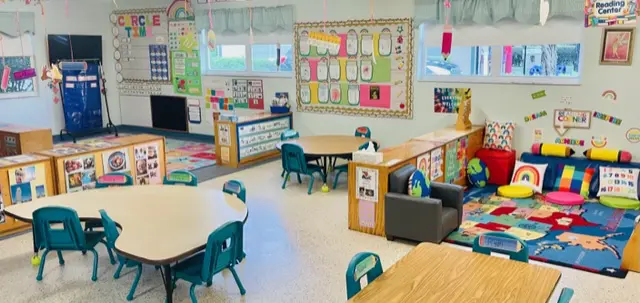Hands-On Curriculum
Peter Pan’s: “Hands-On” Learning Pathway
The curriculum is integrated with ongoing assessment, professional development, and family resources to create a developmentally appropriate program that promotes children’s development. We facilitate learning in the core areas of language, literacy, mathematics, science, social studies, physical, emotional, and social development.
We empower children to become confident, lifelong learners who “love to learn.” We help children approach school and academics with competent readiness skills, positive self-esteem, and the drive for success.
We create developmentally appropriate environments in which each child at every age discovers and learns.
Social and emotional learning is integrated into the teaching of academic standards.
The children learn to recognize and manage their emotions. They set and achieve positive goals while demonstrating caring and concern for others. The children establish and maintain positive relationships, make responsible decisions, and learn to handle interpersonal situations effectively.
Children individually grow and mature at their own unique rates. Our activities support this developmental continuum for each child. Developmental standards emerge into “hands-on” themes that engage all our active learners.


First Years
We recognize that the first years of life are an extraordinary time that sets the stage for all the years to follow. From birth, babies are marvelous learners, immediately investigating the sights, sounds, and feelings of the world. We provide a safe environment rich with opportunities, responsive caregiving, and interactive language experiences. Our daily schedule is a balance of both active and quiet times. A time for independent play, interaction with other children, and teacher-directed activities. Peter Pan's learning environment is developmental and incorporates:
LARGE AND SMALL MOTOR EXPERIENCES: Provide opportunities for kicking, crawling, pulling up and standing, gripping, throwing, manipulating, climbing, pushing, pulling, walking, running, tracking, reaching, grasping, and hand-eye coordination.
SENSORY EXPERIENCES: Expose youngsters to many enriching tactile experiences, including textures, weights and balance, and visual discrimination- colors, patterns, sizes, shapes, smells, sounds, and tastes.
COGNITIVE EXPERIENCES: Enrich children's critical thinking skills with activities that focus on -object permanence, spatial relationships, visual discrimination, classifying, collecting and dumping, cause and effect, and problem-solving.
LANGUAGE, LITERACY, AND MUSIC: Provide responsive and consistent verbal and nonverbal interactions that encourage -babbling, discriminating sounds, mimicry, rhyming, adult-child conversations, enriched print, reading and language interactions, exploration with music, instruments, and singing.
PERSONAL AND CREATIVE EXPRESSION: Encourages expression through art, dance/rhythm, movement, imitation, pretending with dolls, stuffed animals, and dramatic play accessories.
DEVELOPMENT IS A JOURNEY, NOT A RACE.
Preschoolers
CREATIVE STIMULATION/ EMERGENT WRITING: Children explore different media and become familiar with texture, size, color, and shape. Fine motor control develops through art expression and the use of writing instruments... cutting, pasting, painting, tracing, writing, etc. Open-ended language activities and art are incorporated into daily lessons. Enriched print and well stocked writing centers encourage literacy and writing. Skills basic to reading and writing magically grow through the joy of self-expression.
COGNITIVE DEVELOPMENT: How high can blocks stack before they fall? How many counting bears fit in a measuring cup? How long is my foot? How are objects similar or different? Children construct, pattern, and use critical thinking skills. They learn problem-solving skills... balance, shape, size and spatial relationships, conflict resolution, and visual discrimination. Self-confidence develops, and cooperative play escalates. Computer technology in older classrooms further enhances cognitive development.
SOCIAL STUDIES/ DRAMATIC PLAY: Youngsters role-play and express themselves utilizing props, dress-up clothes, and puppets to connect home/school and world experiences. Housekeeping/home living center and playhouses offer magical adventures. Children learn about themselves and their world (Maps, Globes, and Multicultural Studies), and spontaneous discussion and group decision-making develop social skills and expand language fluency, conversational skills and builds vocabulary. This is where language, social studies, feelings, and dreams come to life.
FINE MOTOR/ MANIPULATIVE/ MATH: Little fingers fit parts together, button buttons, etc. Constructing, classifying, sorting, manipulating, working with puzzles, matching activities and engineering allow a child to acquire problem-solving skills and develop hand-eye coordination. Meaningful counting, addition, subtraction, numeral recognition, one-to-one correspondence, serration, ordination, and other fundamental math skills emerge.
GROSS MOTOR: Jump! Swing! Ride! Can you jump on one foot? Climb to the top? Throw the ball? Children develop motor control, strength, and flexibility. Come join in some parachute fun! Each new skill brings physical confidence and the feeling that "I CAN DO IT!"
LANGUAGE/ LITERACY/ EMERGENT READING/ LISTENING/ MUSIC: Teacher-directed lessons involve focus, following directions, and visual/auditory discrimination. Designated "Show & Tell" days encourage oral language development and listening skills. Reading readiness instruction including descriptive interactive language/vocabulary, phonological awareness activities, shared book experiences and integrated content focused activities progresses with enriched print, functional print linked to class activities, Alpha Time, alliteration, letter / number recognition, reading comprehension and writing. The joy of music (Styles, Instruments, Composers) and books (Genres, Authors, Illustrators) brings learning concepts to life.
SCIENTIFIC INQUIRY / SENSORY/ HEALTH: Sensory activities and science experiments allow children to discover, observe, collect, measure, predict, hypothesize, and build self-confidence and motor control. The school garden puts the children in touch with nature and nutrition. Tactile stimulation and experimentation challenges youngsters in the field of physical science and chemistry. What objects float? Explore the lifecycle of the tadpole and butterfly. Where did the dinosaurs go? Why do magnets stick together? A child's curiosity is free to explore as the thrill of discovery is born.
Our curriculum focuses on School Readiness Performance Standards. S.T.E.A.M. (Science, technology, engineering, art and mathematics) activities come to life for the children through problem solving. These skills are integrated throughout the day and stimulate creativity and innovation skills. Children engage in the learning process through developmental experiences that relate to the ways they think, reason, and create. Our responsibility is not only to provide the best educational experience, but to prepare children for their formal years.





